Keeping perishable foods at safe temperatures is incredibly important to all RVers. For this reason, most RVs have a fully-functioning refrigerator, whether it’s a 12V fridge, a 2-way (propane or electric) or 3-way (propane, 120V AC, or 12V DC) unit, or an RV residential refrigerator.
A working fridge keeps foods, beverages, and even medications safe. It provides that extra convenience that’s a step above “camping”. An RV refrigerator means there’s no need for constant ice replenishment and no risk of soggy, spoiled foods as can be the case with old-style camping coolers.
But some RV fridges come with drawbacks and frustrations. They can be temperamental and usually require the RV to be very close to level in order to function properly. They also tend to be very small (which limits contents) and often don’t maintain their temperature all that well, both of which can require many more trips to the market to replenish perishable foods (or foods that perished).
These are some of the reasons why RV residential refrigerators are becoming more widely available in RVs.
What is an RV Residential Refrigerator?
An RV residential refrigerator operates in the same way as a residential refrigerator in a sticks-and-bricks home… because it IS a residential refrigerator. It’s just installed in your RV.
A residential-style refrigerator uses a compressor to keep contents cold and uses AC power to run. That means the same is true of an RV residential refrigerator. Unlike other types of RV refrigerators that use propane either full-time or part-time, a residential fridge in an RV uses AC power all the time.
So, RV residential refrigerators need a constant power supply. That power can come from a power pedestal (in a campground, RV park, or home), from a generator, or from a battery bank (using an inverter). When boondocking and replenishing your power using solar energy, an RV residential fridge requires a significant battery bank and a significant solar array to feed it.
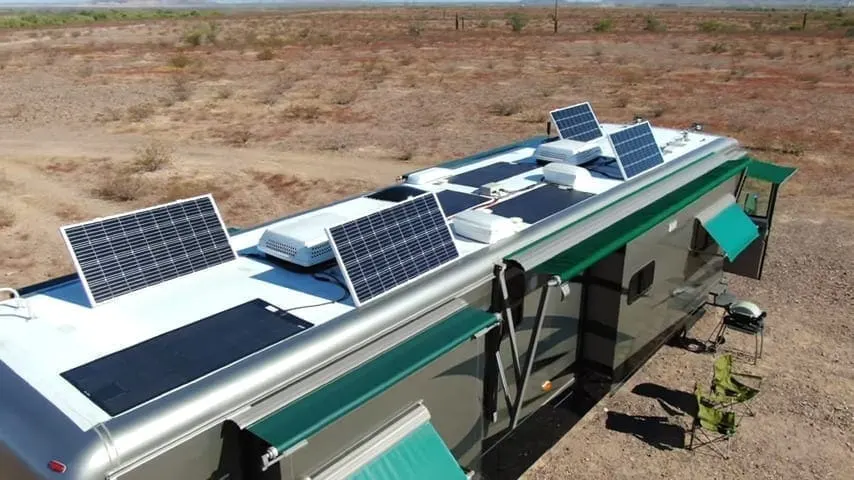
In order to run an RV residential refrigerator off-grid, you’ll want a substantial solar array and battery bank, as well as a generator.
RV Residential Refrigerators vs. 2-Way and 3-Way RV Refrigerators
Now that we know what an RV residential refrigerator is, let’s compare it to 2-way and 3-way RV refrigerators.
2-way RV refrigerators use AC power or LP gas depending on what’s available and the user’s preference. A 3-way RV refrigerator can run on AC power, LP gas, or DC power, running off the house batteries.
7 Benefits of RV Residential Refrigerators
Because RVs have used 2-way and 3-way refrigerators for decades, it’s easy to assume that these are the only available options for RV refrigeration. But as technology progresses, additional options become available that can work better in certain situations.
So while a small camping fridge may work very well for a weekend camping trip, folks who travel long-term or full-timers like us may be better served with a larger, more efficient refrigerator. Let’s have a look at the benefits of making the switch to an RV residential refrigerator.
1. More Room for Food and Drinks
Typical 2-way and 3-way RV refrigerators are almost always smaller than residential fridges. They also have significant bulk behind them due to how they function. With working components taking up so much of their cubic footage there’s less space for food. Less refrigerator storage space means more trips to the store.
Because residential refrigerators don’t require those same bulky components, you have more usable space. And of course, residential refrigerators are larger than a typical RV fridge in general.
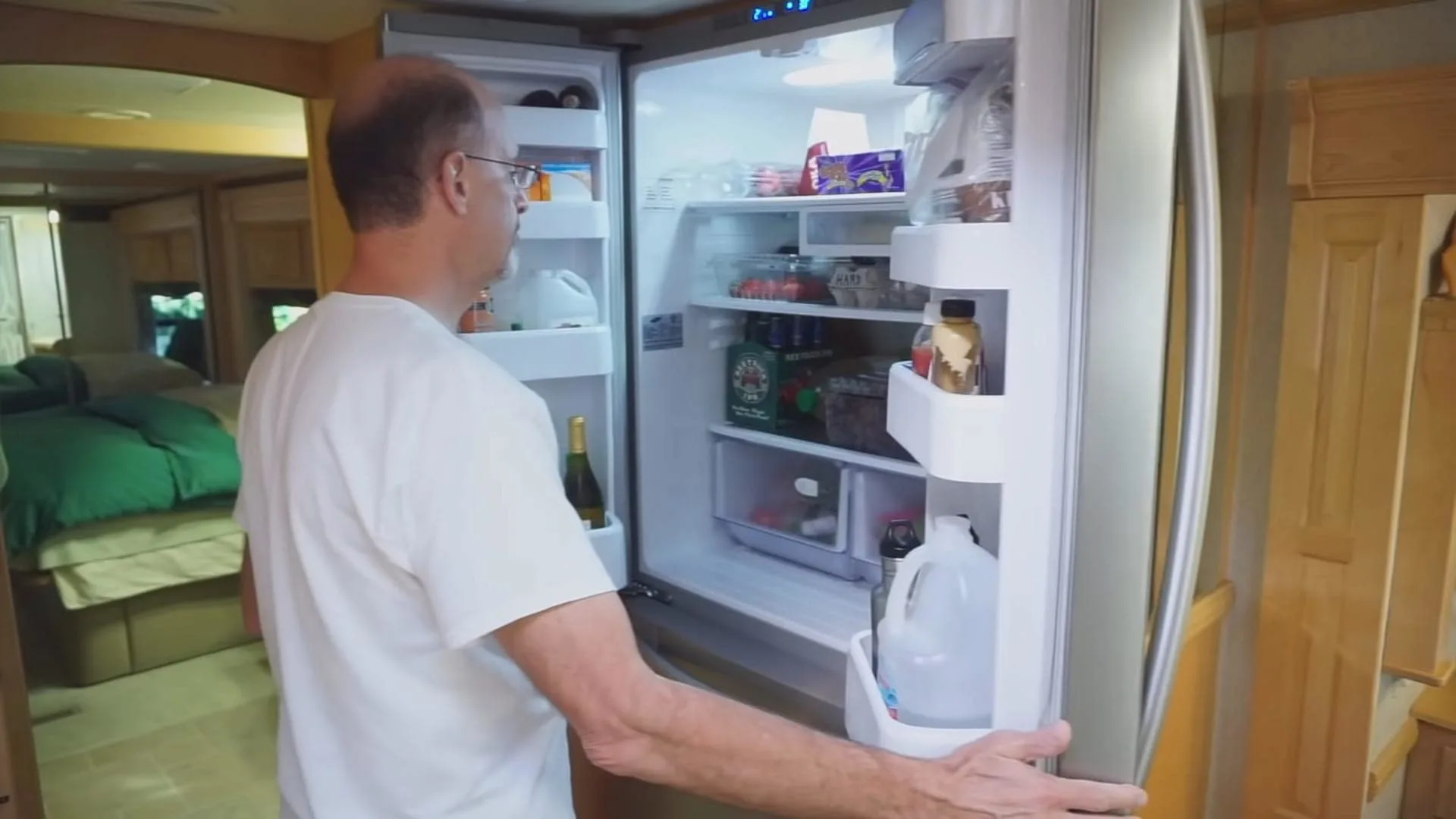
Having a large, fully stocked fridge and freezer make it possible for us to boondock in our favorite remote locations without needing to leave to replenish our food supply.
For us, a well-stocked refrigerator/freezer means we don’t have to leave a fabulous, remote boondocking spot to replenish food for a long time.
2. Consistently Cold Temperatures
Traditional RV refrigerators can be temperamental. One day your food is kept at your desired temperature, and the next day due to a change in ambient temps or some other factor, you find yourself with frozen produce despite using the same settings on the fridge.
RV residential refrigerators are better able to regulate temperatures, relieving us of the frustration of frequently adjusting the temperature based on ambient temperature.
Speaking of temperature, typical RV fridges are notorious for letting ice cream get soft, whereas the freezer in a residential fridge stays properly cold all the time.
3. Less Expensive to Purchase
Residential refrigerators have less complicated components than traditional RV fridges. For this reason and because residential fridges are more readily available, they’re more budget-friendly.
4. Cools Down Faster When Turned on for Travel
An RV residential refrigerator cools quickly as the compressor kicks on and cold air circulates inside. With a standard RV refrigerator, the unit may need to be running for at least 24 hours before use to ensure it’s adequately, and consistently, cold.
5. More Energy Efficient on AC Power
A residential refrigerator with a bottom freezer running on AC power uses around 1 amp/hour, which is a whole lot less than the 6 amps required to run a large standard RV refrigerator on 120V AC.
If you’re using your generator to provide power to your RV, the efficiency of the residential fridge will reduce strain on your generator. And if you’re paying for your electricity consumption at a power pedestal, which is common with monthly stays, a residential fridge will be easier on the pocketbook.
A caveat, though… when running an RV residential refrigerator using your battery bank, your inverter will be running most, or all, of the time, and an inverter requires additional battery power. This is where the larger battery bank and solar array mentioned earlier come into play.
6. Longer Lifespan than a Traditional RV Fridge
In a best-case scenario, traditional RV refrigerators have an average lifespan of about 10-15 years. The lifespan varies considerably based on usage and how well the unit is maintained. Residential refrigerators tend to function reliably for closer to 18-20 years or more. Additionally, residential refrigerator repairs are less costly, and parts are more readily available.
There is a caveat here though as well. Residential refrigerators weren’t designed with travel in mind. That may shorten their lifespan in comparison to what you might expect when using one in a sticks & bricks house. Because they haven’t been used in RVs until relatively recently, there’s not enough data about their longevity when used in RVs.
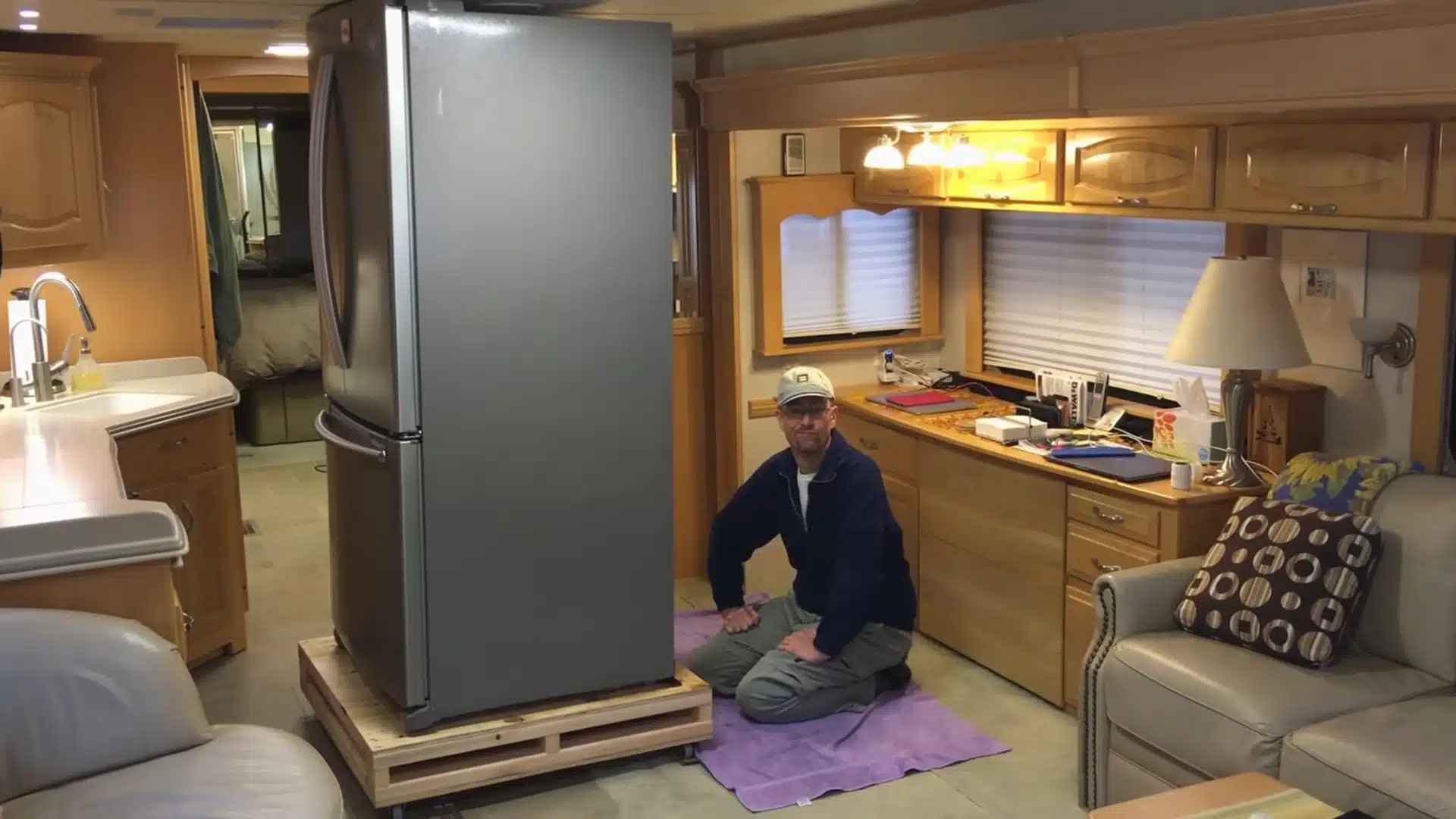
Should a residential fridge require repair or replacement, it will almost always be a lot less expensive than an RV fridge.
7. Less Maintenance
RV residential refrigerators are virtually maintenance-free, requiring little more than keeping them clean. As long as you have power going to it, it’s likely to function properly.
A typical RV refrigerator requires frequent defrosting to ensure proper cooling. It’s also important that they have adequate airflow to keep cool, so some require the use of a small fan in the refrigerator compartment.
Another potential issue with some RV refrigerators involves safety. Because they use a propane burner to stay cool (seems counterintuitive, doesn’t it?!), there can be a fire hazard. This may not be a problem with some RV refrigerators, but it’s a known issue with others. Just search YouTube for RV fires and you’ll see that many of them start at the fridge.
Are There Any Downsides to RV Residential Fridges?
While the benefits of RV residential refrigerators are numerous, there are some downsides. Perhaps the most obvious downside is that you can’t run it on propane. This makes boondocking a bit more complicated, but doable.
Boondocking requires a bit more preparation with a residential refrigerator and depending on your current off-grid capabilities, you might need to upgrade your solar system and your battery bank to accommodate a residential-style RV fridge off-grid. Or, you need to be prepared to run your generator more often, as the residential refrigerator will drain your battery bank pretty quickly.
Another downside to making the switch to a residential fridge is the fact that it might not be possible to get the fridge through your RV’s doorway! Some RV owners have had to temporarily remove a slide to get a large fridge into their RV. We’ve had to remove a windshield to install a new fridge in our RV!
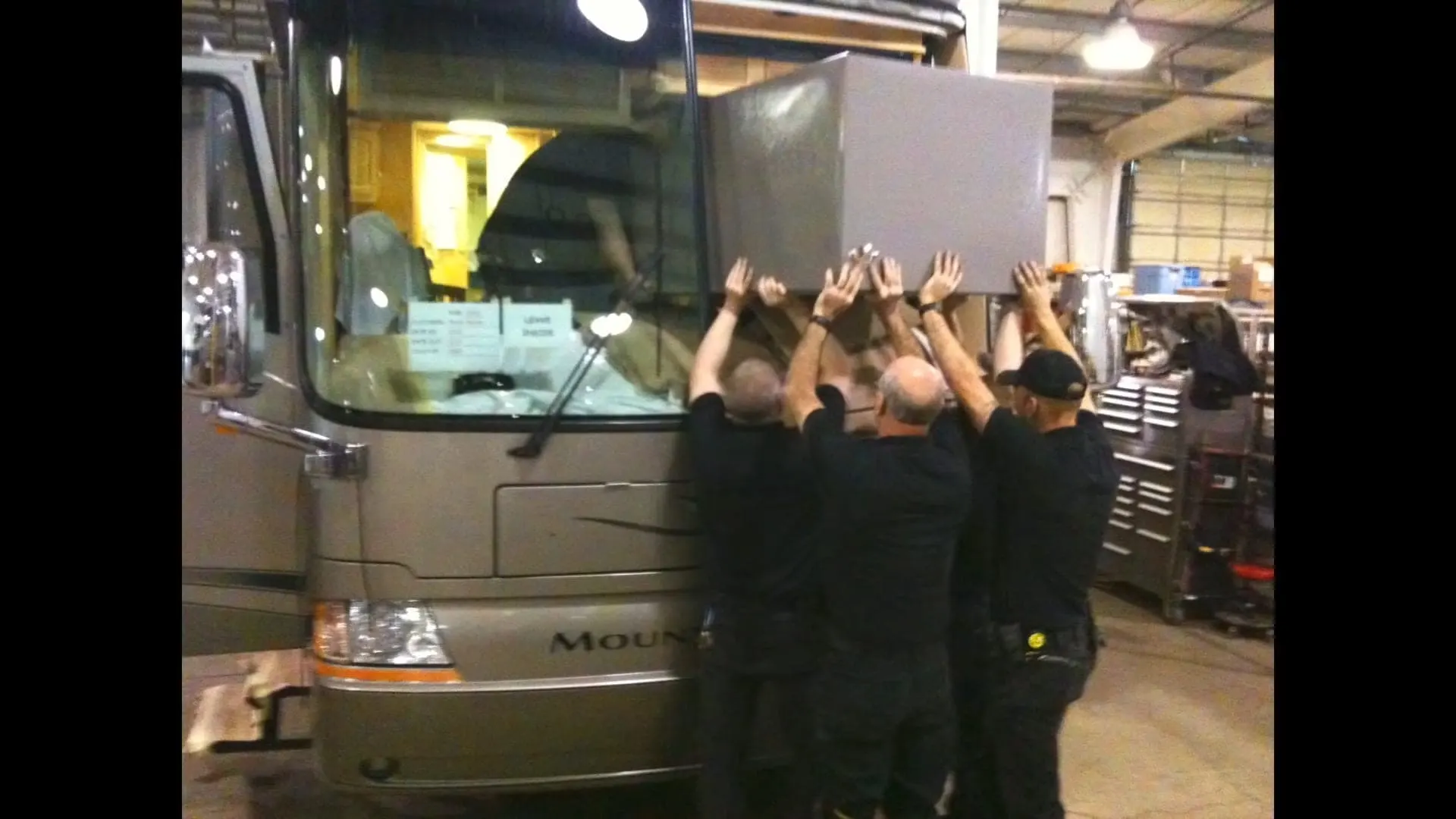
Large residential refrigerators can be difficult to get into an RV, requiring ingenuity and teamwork!
And we also had to have an old fridge cut in half for removal from our RV!
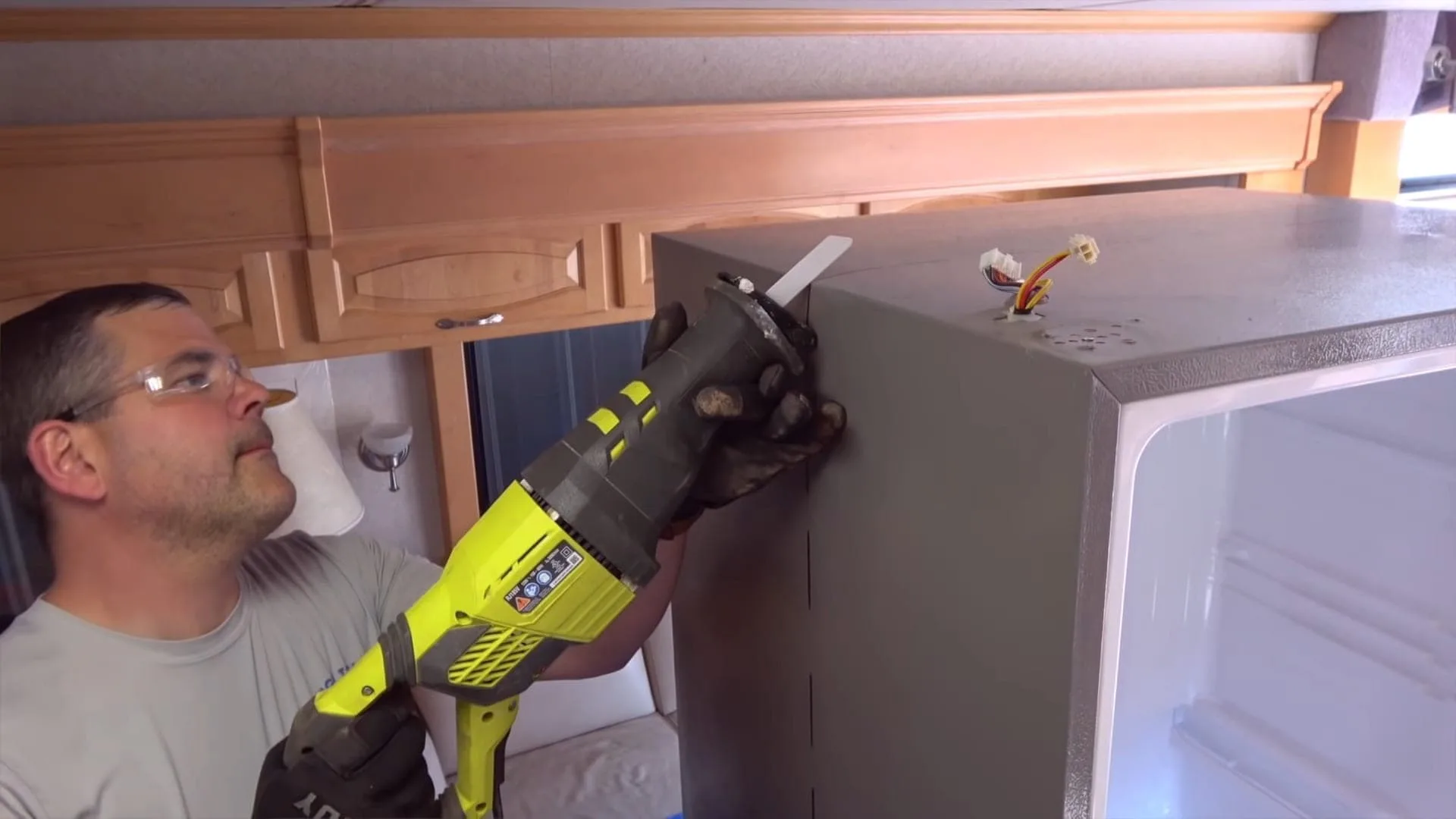
Traditional RV fridges can be difficult to remove from an RV when they require replacement.
Another consideration is that residential refrigerators are not typically designed with significant movement in mind. During travel, an RV experiences substantial shaking, which can sometimes lead to failures.
Although there are pros and cons to every situation, for us the pros of having a residential fridge outweigh the cons. That said, knowing what the cons are ahead of time can help you to make an informed decision and prepare you for any issues that may occur down the road.
Is Switching to an RV Residential Refrigerator Worth It?
Each RVer’s travel style is different. A residential fridge may work best for some travelers, while a traditional RV fridge will work best for others. Your travel style and your RV’s power setup will be factors in your choice.
If you boondock frequently, as we do, but your RV doesn’t have a generator or significant solar and battery banks, an RV residential refrigerator may not be the best choice for you. Without the ability to power a residential fridge with relative ease, the traditional RV fridge becomes the better choice.
If you have frequent access to shore power or a sufficient solar array and battery bank, you may consider the switch to a residential refrigerator, particularly if you find yourself wanting more cold and frozen food storage space or more reliable performance.
In the end, we all just want our food to remain at a safe temperature with as little effort as possible.
Geek Out with Us Every Week
Join our newsletter to learn about all things RV-related. Every week we offer free tips, tricks, product reviews, and more to our online community of RVers. Whether this is your first time on the road or you’re a seasoned expert, we’d love for you to geek out with us!

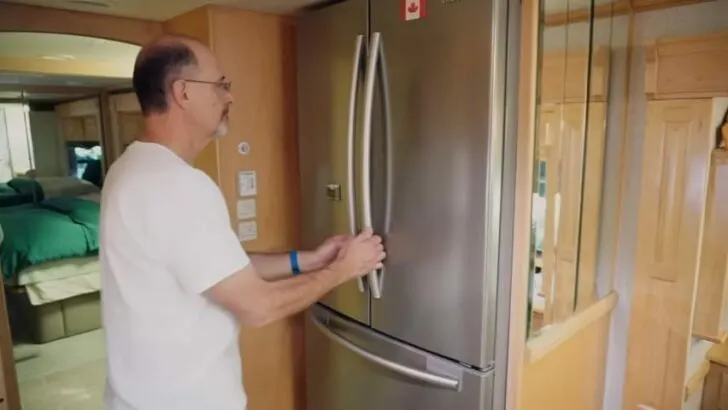
lee
Sunday 11th of September 2022
Maybe purchasing a New 40 ft Fifth Wheel and dont anticipate moving it regularly. That said the manufacter is making a big deal about 18 cf Norcold DC unit. My preference is Residential 17-20 ft because we expect to be full timers.Norcold had reduce warranty to 1 year plus this model is fairly new. Your input is appreciated please. Thank you
C & J
Thursday 8th of September 2022
Hi! Just wondering which fridge you went with in your RV. We are currently just starting to try to find an RV to move into full-time and trying to work in a full-sized fridge as well as a computer bank for two of us to sit and work is a challenge. Thanks for this article as it was very helpful.
TheRVgeeks
Thursday 8th of September 2022
Hi C&J! We have a Samsung 17 cubic foot (approximately) counter-depth model # RF18HFENBSR. The main reason we got it is because it’s the only unit available in the local area we were looking in that would fit in our space. We did have a previous Samsung that didn’t last as long as we would’ve liked, as their reputation isn’t the greatest. Although to be fair, nobody else’s is either!
Sonny Rivera
Tuesday 22nd of June 2021
I would appreciate the part # for the mounting bracket used to bolt the unit to the floor from the back. Thank you!
TheRVgeeks
Tuesday 22nd of June 2021
No specific part number for that, Sonny... it was just a piece of slotted angle iron that was cut to the width of the fridge and screwed into it and the floor.
Dave Densmore
Friday 14th of May 2021
Our coach's 8 cu ft 3-way is pretty well toast, we can’t depend on it working anymore. I can’t complain too much, it’s 20 years old. Trying to find a residential of decent size to fit the hole has been near impossible, or more than I want to spend. I’m probably going to go with the 12V or 120 AC unit from JC Refrigeration. The move by manufacturers to 12v compressor RV fridges has me leaning that way. Sure would like to know more about them though.
TheRVgeeks
Friday 14th of May 2021
Hi Dave. Sorry to hear your RV fridge is giving up the ghost... but 20 years is a good run for appliances these days! ;) It can definitely be hard to find a residential fridge that will fit into the opening left by an RV fridge (as you've found), often leaving you with more-expensive options because they're less common.
12V compressor fridges are definitely a nice new option... eliminates the need to have the inverter running all the time (which wastes power if nothing else requires it to be on) and avoids the hassles of absorption-style refrigerators. The JC Refrigeration units are an interesting option (don't know if you saw Tom & Cait Morton's video about converting their absorption fridge to 12V compressor using a JC unit: https://www.youtube.com/watch?v=Yte1V3CkDrw ).
There are also new units available from the bigger manufacturers like Dometic, Norcold, and Furrion. They're likely more expensive than either the JC Refrigeration conversion unit OR a 120V residential fridge that would fit. But they ARE custom-designed for RV use, so may have some advantages (like a more robust compressor designed to handle the vibration of running while the RV rolls down the road?!).
Dave Reyburn
Friday 14th of May 2021
I just now had to replace the compressor in my Maytag residential refer in my 2013 Mountain Aire. I'm surprised it did not live more than 8 years, since the cheap Sears refer I have in my home has lasted almost 30 years and refuses to fail!! I was lucky to find a guy locally that does nothing but closed system repairs. Almost no appliance repair shop will touch a closed system repair anymore. Extended warranty company refused to reimburse me for a new unit, so now I have my original working like new and hopefully for many years. He was able to do the repair in the motorhome. I moved the front seats out of the way and brought the refer to the front for ease of access. A whole lot less hassle and expense of having it removed through a side window.
TheRVgeeks
Friday 14th of May 2021
Sounds like quite a job, Dave. Wish our first two refrigerators had been repairable inside the RV. But cutting one in half was fun, too! LOL